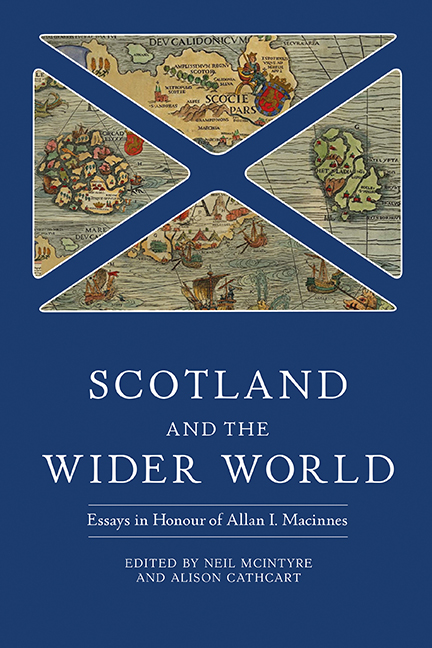Book contents
- Frontmatter
- Contents
- List of Contributors
- Preface
- List of Abbreviations
- 1 Covenants, Clans and Unions in Context: Celebrating the Scholarship of Allan I. Macinnes
- Part I Peoples and Cultures in Britain and Ireland
- Part II War, Religion and the House of Stuart
- Part III Union, Empire and Enlightenment
- List of Publications
- Index
- Tabula Gratulatoria
- Studies in Early Modern Cultural, Political and Social History
10 - The Two Rabs’ Big Adventure: Scottish Networks and Influence in Imperial Britain
Published online by Cambridge University Press: 26 May 2022
- Frontmatter
- Contents
- List of Contributors
- Preface
- List of Abbreviations
- 1 Covenants, Clans and Unions in Context: Celebrating the Scholarship of Allan I. Macinnes
- Part I Peoples and Cultures in Britain and Ireland
- Part II War, Religion and the House of Stuart
- Part III Union, Empire and Enlightenment
- List of Publications
- Index
- Tabula Gratulatoria
- Studies in Early Modern Cultural, Political and Social History
Summary
Scottish men criss-crossed Britain and Ireland, the continent of Europe and the Atlantic for political, economic and colonial adventure. This essay will focus on two Ayrshire neighbours: Robert Hunter, grandson of Robert Hunter, 20th laird of Hunterston, and son of lawyer James, born in Edinburgh in 1666; and Robert Cunyngham, born in 1669, the eighth of nine sons of Richard Cunyngham, the purchaser of the barony of Glengarnock. From Covenanting backgrounds, they were part of the generation of Scots who, through service, forged a place for themselves in British society, engineering and benefitting from opportunities created by, first, the Williamite settlement of 1688–89 and then the 1707 Act of Union. By their deaths – in 1734 and 1743, respectively – both men could claim to be metropolitan men of fashion, and yet occupied a liminal space between newly minted acceptance within England and the comforts of traditional Scottish connection. Ties of kith and kin generated an ‘economy of obligation’, and we might refer to a parallel ‘society of obligation’, with familial relationships expressed through patriarchal channels: the military, the church and trade. The two Rabs met their obligations and propelled themselves into Augustan society via their relationships with others who were perched precariously on the fringes. In some cases, this meant Celtic networks and the reshaping of British polities and society. Often, it involved renegotiating the nature of religious confession and profession in which European Protestants were willing to exchange nation to secure faith, and this essay will follow Huguenots and Palatines in this process. Underpinning economic and societal bonds was moral obligation, and in this regard the Rabs negotiated their establishment venture through women. Examining a micro-study of two Ayrshire men highlights important larger questions about the construction of empire through contested and resolved negotiations. It marries the social history of empire with its economic and political counterparts. Through the complexities of interwoven obligations, the restless back and forth across multiple sites, and the fluidity and dexterity required for social mobility in Hanoverian Britain, we can discern the importance of the ‘obligations of Scottishness’.
The Hunters and Cunynghams were families that had suffered for their commitment to Reformed religion who, with the overthrow of James VII and II, saw the opportunity for advancement.
- Type
- Chapter
- Information
- Scotland and the Wider WorldEssays in Honour of Allan I. Macinnes, pp. 150 - 166Publisher: Boydell & BrewerPrint publication year: 2022

